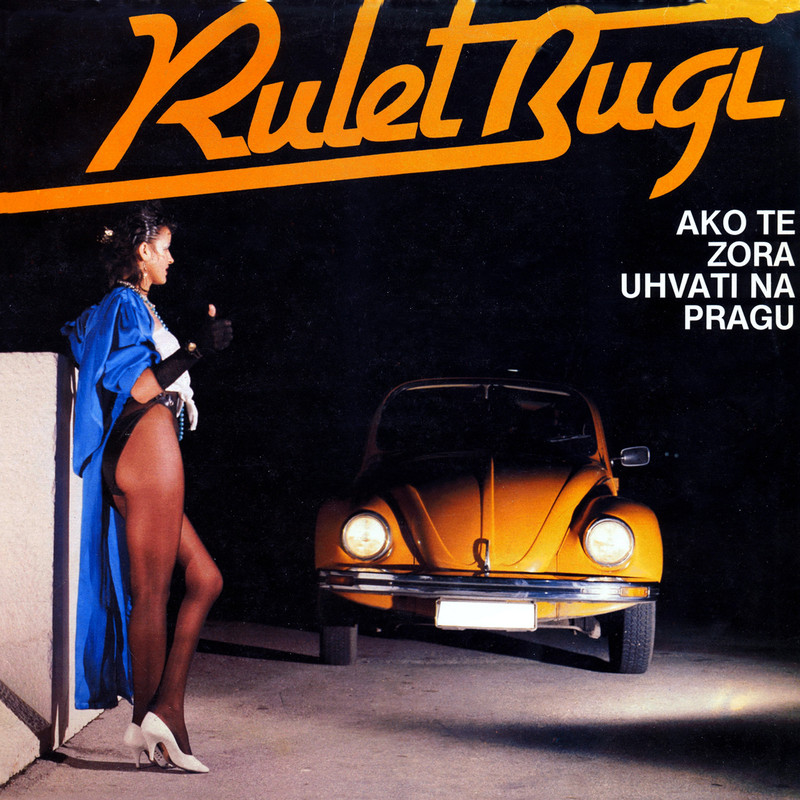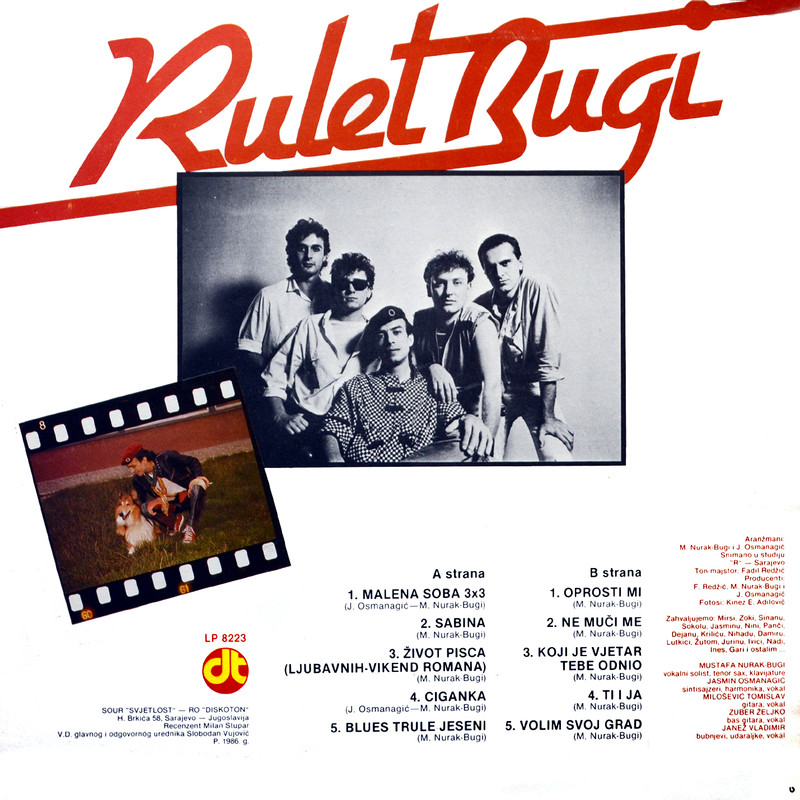nedjelja, 31. prosinca 2023.
subota, 30. prosinca 2023.
RIBLJA ČORBA - Osmi nervni slom (1985)
"Osmi nervni slom" is the seventh studio album by RIBLJA ČORBA. The album produced by Kornelije Kovač, who also played keyboards on the album. The song "Amsterdam" featured Eddy Grant on vocals. The ballad "Prokleto sam" featured actress Ana Kostovska on backing vocals. "Jedan čovek" featured Jova Maljoković on saxophone. (from wikipedia)
petak, 29. prosinca 2023.
RIBLJA ČORBA - Mrtva priroda (1981)
RIBLJA ČORBA was officially formed on the August 15, 1978 in kafana "Šumatovac". The band was formed by former Rani Mraz member Bora Đorđević (vocals, acoustic guitar and songwriter) and former SOS members Miša Aleksić (bass guitar), Miroslav Milatović (drums) and Rajko Kojić (guitar). Their intention was to name the band Bora & Ratnici, but eventually, the band was named Riblja Čorba, which was at the time Belgrade slang for menstruation. Riblja Čorba had its first concert in Elemir on the September 8. In November, Radio Belgrade show "Veče uz radio" celebrated its birthday in Subotica sport hall. Riblja Čorba played only two songs and animated the audience. They won new fans at the fundraising concert in Sarajevo and BOOM festival in Novi Sad. On the December 22 they released their first single, "Lutka sa naslovne strane", a hard rock ballad about a fame-hungry model, which became an immediate hit on radio stations. At the time Đorđević decided to leave acoustic guitar and dedicate himself to singing. Soon Riblja Čorba got rhytm guitarist, Momčilo Bajagić, who became a member of the band on Kojić's suggestion. This lineup held its first concert on the January 7, 1979 in Jarkovac. On the February 28 they held a long promoted concert in Dom omladine, which was the band's first concert in Belgrade. While the band perdformed "Lutka sa naslovne strane" Đorđević broke a fashion doll. Minka Kamberović's ballerinas also took part in the concert. That evening Riblja Čorba played most of the songs that would be released on their first album. In the beginning of March the band held several concerts in Macedonia. On their concert in Dolovo Aleksić fell from the stage and broke his leg, so until the end of the tour he was replaced by Aleksandar Cvetković. On March 19 they released their second single with songs "Rock'n'Roll za kućni savet" and "Valentino iz restorana". Marina Tucaković wrote part of "Valentino iz restorana" lyrics, which was the only time in Riblja Čorba career that the writer of the lyrics was someone outside the band. Riblja Čorba spent the summer in Makarska, where they practiced for the coming debut album promotin. The concert was held on September 1 in Tašmajdan. Although the album was released ten days after the concert, Tašmajdan was sold out. Bulevar, Formula 4 and Meri Cakić's antiballet group Ribetine also performed at the concert. Meri Cakić, who appeared on the concert wearing garter belts, has, by some, inspired Đorđević to write "Lutka sa naslovne strane". On this concert Đorđević got his concert nickname Bora Majstor. Several days later Đorđević went to Doboj and Kojić went to Sarajevo, due to their army obligations. On November 28, the band, without Đorđević and Kojić performed at the marathon concert in Sarajevo. Riblja Čorba's debut album, "Kost u grlu" was soon released. Album was met with a great thrill. It brought a large number of hits: "Zvezda potkrovlja i suterena", "Egoista", "Ja sam još ona ista budala", "Ostani đubre do kraja". The album was sold in more than 120,000 copies, Đorđević was proclaimed the rock musician of the year by some music magazines, and Riblja Čorba's hard rock sound with blues inputs achieved high success, although the age of New Wave was about to begin. At the end of the July 1980 Đorđević appeared in Belgrade to record "Nazad u veliki prljavi grad" with Bajagić, Milatović and Kojić. On December 31 and January 1, 1981 Riblja Čorba held two concerts with Atomsko Sklonište. Concerts were held in Pionir Hall in Belgrade and were advertised as "Atomska Čorba". In February 1981 Riblja Čorba released its second album "Pokvarena mašta i prljave strasti". Album brought a whole serie of hits: "Ostaću slobodan", "Lak muškarac", ballads "Neke su žene pratile vojnike", "Nemoj srećo, nemoj danas", "Dva dinara druže", "Rekla je". Riblja Čorba promoted album on their Yugoslav tour. After their return to Belgrade, they held a concert in Kalemegdan's Rockoteka. Band's special guest was Ian Gillan Band's bass guitarist John McCoy. In the summer band recorded its third album "Mrtva priroda" with McCoy as the producer. "Mrtva priroda" brought Riblja Čorba's first political song, "Na zapadu ništa novo". Album was sold in more than 450,000 copies. (from wikipedia)
četvrtak, 28. prosinca 2023.
RIBLJA ČORBA - Istina (1985)
"Istina" is the sixth studio album by RIBLJA ČORBA. The album is considered by fans and critics alike to be one of Riblja Čorba's finest works, as well as the band's triumphant comeback after the unsuccessful album "Večeras vas zabavljaju muzičari koji piju". "Istina" is also significant as the band's first album recorded with guitarists Vidoja Božinović and Nikola Čuturilo, the two joining the band after the departure of Rajko Kojić and Momčilo Bajagić. The album was recorded during the winter 1984–1985. It was recorded by Goran Vejvoda and produced by John McCoy. After Riblja Čorba's record label Jugoton refused to release the songs "Snage opozicije", "Pogledaj dom svoj, anđele", "Alo", and "Dvorska budala" because of the provocative political-related lyrics, the band signed back with Jugoton's main competitor PGP-RTB. Nevertheless, the song "Snage opozicije" was not released on the album, and it only saw the light of day some thirteen years later on the 1997 compilation album "Treći srpski ustanak". The track "Disko mišić" featured Goran Bregović, leader of Riblja Čorba's biggest rivals at the time, Bijelo Dugme, on vocals (Đorđević previously made a guest appearance on Bijelo Dugme's 1984 self-titled album, singing with Bregović in the song "Pediculis Pubis"). (from wikipedia)
srijeda, 27. prosinca 2023.
RIBLJA ČORBA - Buvlja pijaca (1982)
utorak, 26. prosinca 2023.
RIBLJA ČORBA - U ime naroda (1982)
ponedjeljak, 25. prosinca 2023.
RIBLJA ČORBA - Večeras vas zabavljaju muzičari koji piju (1984)
"Večeras vas zabavljaju muzičari koji piju" is the fifth studio album from influential Serbian and former Yugoslav rock band RIBLJA ČORBA. As Riblja Čorba's record label PGP RTB did not want to finance recording in London, the band moved to Jugoton. Immediately after the album was released, state's censors declared songs "Mangupi vam kvare dete" and "Besni psi" ethicaly unacceptable. "Besni psi" caused an international scandal. Beacuse of the lyrics "Grčki sverceri, arapski studenti, negativni elementi, maloletni delikventi i besni psi", the embassies of three Arabian countries and Zaire protested, complaining that songwriter Bora Đorđević had equated foreign students and mad dogs. The Yugoslav Ministry of culture ordered an analysis of the song by the experts. With dark, depresive atmosphere, album was not as nearly successful as Riblja Čorba's previous albums bringing only one hit, Momčilo Bajagić's gentle ballad "Kad hodaš". (from exyupoprockmadness.blogspot.com)
nedjelja, 24. prosinca 2023.
subota, 23. prosinca 2023.
četvrtak, 21. prosinca 2023.
srijeda, 20. prosinca 2023.
utorak, 19. prosinca 2023.
RIBLJA ČORBA - Kost u grlu (1979)
ponedjeljak, 18. prosinca 2023.
RIBLJA ČORBA - Koza Nostra (1990)
"Koza nostra" is the tenth studio album from Serbian and former Yugoslav rock band RIBLJA ČORBA, released in 1990. "Koza nostra" is the first studio album recorded with guitarist Zoran Ilić, who came to Riblja Čorba as a replacement for Nikola Čuturilo. The song "Al Kapone" featured Branimir Štulić and Azra members on backing vocals. "Gde si u ovom glupom hotelu" featured former Suncokret members Gorica Popović, Snežana Jandrlić and Biljana Krstić on backing vocals. Keyboards on the album were played by Bajaga i Instruktori member Saša Lokner. The album hits included a cover of Chuck Berry's song "Memphis, Tennessee", Riblja Čorba version entitled "Crna Gora, Bar", the punk rock song "Deca", and "Tito je vaš", which directly ridiculed late Yugoslav president Josip Broz Tito. (from wikipedia)
nedjelja, 17. prosinca 2023.
subota, 16. prosinca 2023.
MARKO BRECELJ - Cocktail (1974)
MARKO BRECELJ was born 1951 in Sarajevo, Bosnia And Herzegovina (ex-Yugoslavia). A failed student of physics at Ljubljana University and composer of film music with a Golden Palm award. Played violin in the band Krik with whom he performed at Subotica Youth Festival in 1973/74. In 1974 Brecelj recorded solo debut LP "Cocktail" which included singer-songwriter style of avant-garde blues-based songs accompanied with orchestral arrangements by Bojan Adamić. In this period he joined the band Sedam svetlobnih let who were soon to change name into Buldožer. In 1975 with his band Buldožer made quite a big draft in former Yugoslavia concerning the term rock-music. After leaving Buldožer in 1979, with later groups - Zlatni zubi, Marjanov čudni zajec, Beli crnci, Javna vaja managed to stay "under the ground". He built an image of a cynical, unexpected and extravagant-prone performer who used to appear on stage in a wheelchair, burn his hair and beard, make acrobatics and tell hilarious and funny jokes in front of audience bursting in laugh. During the 1980s his noteworthy releases included EP "Parada" in 1981 and LP "Svinjam dijamante" with the group Marjanov čudni zajec in 1985. With the band Strelnikoff he recorded an album in 1994, which included several covers of old Buldožer songs. He is living in Kopar, Slovenia, where he was the director of "Mladinski kulturni centar". This is where many young creative rock bands were given opportunities to perform. In recent years he has been active in politics as the president of "Društvo prijateljev zmernega napredka" and as candidate for the mayor's office in Kopar. Brecelj's music can be described as singer/songwriter style (vocal and guitar) with avant-garde approach. His lyrics are bitter, cynical and full of humour and social commentary. One can imagine a cross between Frank Zappa, Tom Waits, Krautrock, punk and RIO. Essential albums for listening are "Cocktail" (1974) and "Svinjam dijamante" (1985). (by Sead S. Fetahagić)



















































